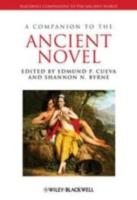
Wiley Blackwell (2014) h/b 612pp £120.00 (ISBN 9781444336023)
This excellent series, Blackwell Companions to the Ancient World, now contains nearly fifty titles, and it seems to me to have been consistent in achieving its stated aims of providing sophisticated and authoritative overviews of periods of ancient history, genres of classical literature, and the most important themes in ancient culture. This volume comprises approximately thirty-seven concise essays written in a clear, provocative, and lively manner, ‘designed for an international audience of scholars, students, and general readers’. This area of study has recently seemed to be breaking out from its specialist confines in doctoral theses and expensive monographs: for example, The Cambridge Companion to the Greek and Roman Novel (CUP 2008, ed. Tim Whitmarsh), the nineteen chapters of which appear frequently in the reference sections here. For many of us, I suspect, if it had not been for Balme’s The Millionaire’s Dinner Party and Balme and Morwood’s Cupid and Psyche, we might not have read any of the texts covered in this volume at all. Speaking for myself, that is a significant loss, to be rectified now by reading the collected translations in B.P. Reardon’s anthology (4th revised edition, 2008).
There are four parts to this volume: Novels and Authors (divided into Greek and Roman); Genre and Approaches; Influences and Intertextuality; Themes and Topics. There were very few chapters in any part which I did not find engaging. The opening eleven chapters would be an excellent place to direct any reader approaching the texts or genre for the first time. The five major Greek novels and two major Latin ones lead the way, by (in order of presentation) Chariton, Longus, Xenophon, Achilles Tatius, Heliodorus, Petronius and Apuleius. Lesser or fragmentary texts are also dealt with succinctly. There is a pleasing lack of conformity in the approaches taken by the contributors, some offering a summary of the text discussed and others not; all, however, tackle important issues of authorship (whether biographical and dating controversies or contested attributions), recurring themes and generic conventions. There is little theoretical obfuscation to be found anywhere in the chapters: it seems to me that the ‘general reader’ of the series’ mission statement has been kept in mind by nearly all of the contributors.
My own personal interests may dictate which chapters, apart from the essential introductory ones, I would recommend most: De Temmerman on ‘Characterisation’, the sequence of ten chapters on intertextual matters across the novels (e.g. Hallett and Hindermann on ‘Roman Elegy and the Roman Novel’ or Zanetto on ‘Greek Novel and Greek Archaic Literature’), the chapters on gender, education and Greek love, or finally Winkler on the links between Achilles Tatius, Heliodorus and Alfred Hitchcock (with frequent recourse to Aristotle on ‘the wondrous’, ‘the irrational’, etc).
I have some criticisms: the relevance of some chapters to the subject-matter of the volume is not made clear (e.g. a survey of ‘Latin Culture in the Second Century AD’) and there is inconsistency in the handling of quotations, especially Greek which is sometimes written in transliterated form, but more often not. There are, though, far more positive things to say about this book than negative. It would make an excellent additional book alongside Reardon and Whitmarsh.
Stephen Chambers – Balliol
